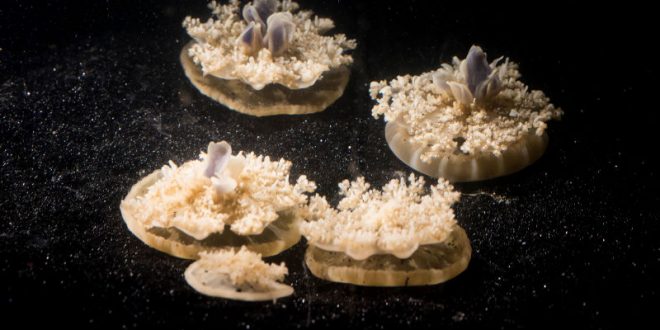It turns out even brainless creatures such as jellyfish need to sleep. This extraordinary discovery, reported on by researchers at the California Institute of Technology, Pasadena, makes sleep even more mysterious than it already is.
In a paper published in the journal Current Biology, a team led by Caltech biologist Paul Sternberg show that jellyfish from the genus Cassiopea – species that lack brains, hearts or blood, and which spend most of their lives upside down on the ocean floor, pulsing a bit – doze off for periods during the night.
Furthermore, if denied the opportunity for a spot of shut-eye, the jellyfish fall victim to sleep deprivation and are likely to nod off suddenly during the day.
To make this finding, Sternberg and his colleagues had to first come up with a workable definition of what sleep might look like in a jellyfish. They decided to focus on three phenomena – decreased activity, decreased response to stimuli, and an increased drive to sleep when prevented from doing so.
By observing the jellyfish in lab tanks, the first two were comparatively easy to establish. Most of the time, Cassiopea, known as “upside-down jellyfish”, hang about on the ocean (or tank) floor and pulsate 58 times a minute. The researchers noted that for periods during the night, the pulse rate dropped to 39.
To test reduced sensitivity to stimuli, jellyfish were placed on glass platforms inserted towards the top of their tanks. The platforms were then withdrawn.
If the test was done while the jellyfish were pulsating at their higher rate, the animals immediately headed for the tank floor. When they were pulsating at the slower rate, however, they floated around in mid-water for a few seconds before apparently “waking up” and reorienting themselves.
Testing for sleep deprivation proved slightly more challenging, but the researchers came up with a solution that was both gentle and effective. They set a wave motion going in the jellyfish tanks overnight – effectively poking the Cassiopea every 10 seconds for 20 minute periods and forcing them to stay awake through the dark hours.
They observed that the jellyfish then fell into the quiescent 39-pulses-per-minute state for periods during the day – apparently nodding off when they would normally be awake.
The results show that sleep is an extraordinarily widespread behavior through the animal kingdom, indicating that the genes that control it are both ancient and robustly retained. It’s a conclusion that prompts a fascinating question: in the story of life, just when did sleep emerge?
“It may not seem surprising that jellyfish sleep – after all, mammals sleep, and other invertebrates such as worms and fruit flies sleep,” says co-author Ravi Nath.
“But jellyfish are the most evolutionarily ancient animals known to sleep. This finding opens up many more questions: is sleep the property of neurons? And perhaps a more far-fetched question: do plants sleep?”
Agencies/Canadajournal
 Canada Journal – News of the World Articles and videos to bring you the biggest Canadian news stories from across the country every day
Canada Journal – News of the World Articles and videos to bring you the biggest Canadian news stories from across the country every day



